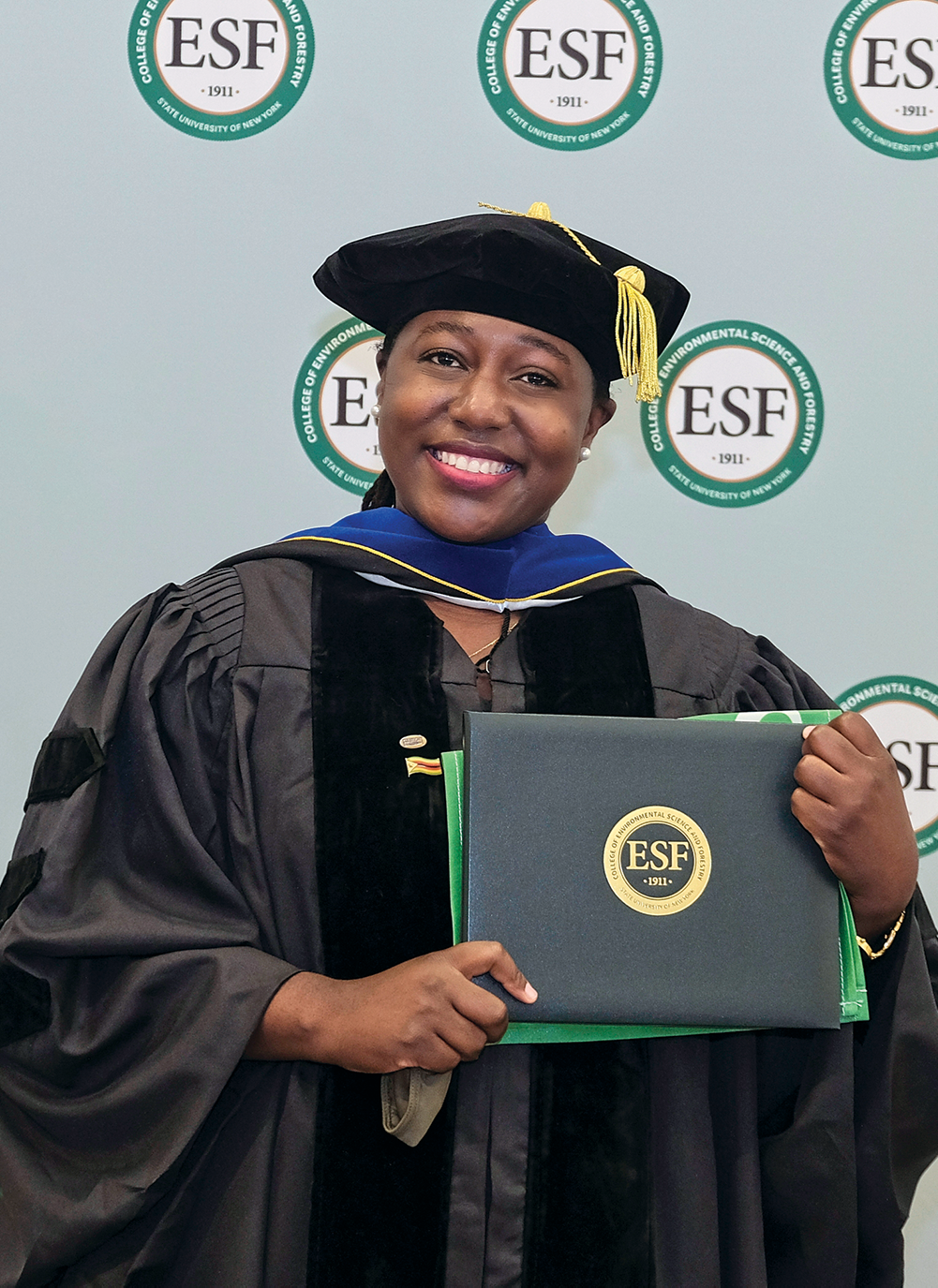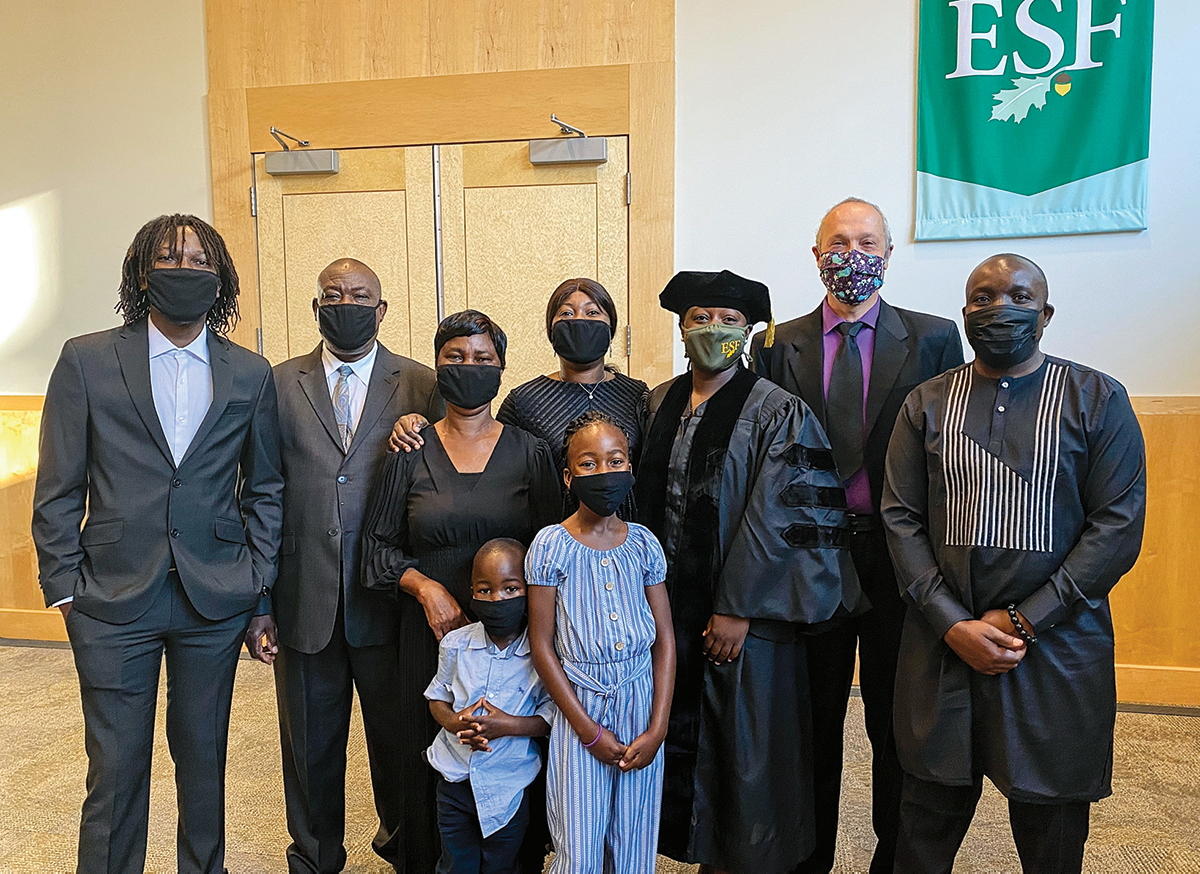
Charity Nyelele ’20
On Oct. 18 and 19, 2021, ESF and SU welcomed back the Class of 2020 for an opportunity to celebrate with an in-person graduation on campus. It was a chance for family and friends to gather and recognize the accomplishments of a class that had previously had a virtual graduation due to the pandemic. The ESF Alumni Association and the College hosted a champagne toast, as well as a name recognition ceremony, prior to the official Commencement ceremony held in conjunction with Syracuse University in the Stadium. It is during this time that I had the opportunity to meet Dr. Charity Nyelele ’20 and her family, who flew from Zimbabwe to be part of the hooding ceremony where she was recognized for completing her Ph.D. After meeting Dr. Nyelele, I knew I wanted to share her story with our alumni, and she graciously took time from her busy schedule to answer a few questions.
Fulbright scholar aims to help ‘chart the path’ for her community in Zimbabwe
DC: Can you tell me about your background and what led you to the environmental field?
CN: From an early age, I had an interest in under- standing how ecosystems differed and responded to both natural and anthropogenic factors. On numerous bus rides to spend holidays in my rural home of Binga (Zimbabwe), I would gaze out the window and wonder why the vegetation changed as the bus moved. When I finished high school, it felt natural to apply to study geography with a bias toward the environmental sciences at the University of Zimbabwe.
My undergraduate research explored spatial variations of grass biomass along Avondale stream in Harare. During my Master of Philosophy (MPhil) research, I had the opportunity to answer some of my earlier questions as I explored issues of tree species diversity, habitat fragmentation, and land cover changes at the University of Zimbabwe. I carried out my MPhil research in Chimanimani and this was exciting because the ecosystem there is far different from the Savanna of where
I had grown up in Bulawayo and surrounding Matabeleland. Chimanimani is in the Eastern Highlands and boasts of unique natural forests, as well as plantations of exotic tree species such as eucalyptus and pine. This fueled my interest in ecosystems even more, especially looking at the large ecological footprint of human activities on the environment (parts of these forests and plantations in Chimanimani were being transformed into agricultural land as part of the government’s resettlement exercise). During my MPhil, I was a research assistant at an environmental research institute (Institute of Environmental Studies at the University of Zimbabwe) and upon completion, I worked as a program officer for an agriculture and livelihoods research-based non-governmental organization.
I have always had a passion to reach the highest level of education and I knew the next logical step in an academic career was to pursue a Ph.D. I applied for and received a Fulbright scholarship to study in the United States and was placed at ESF. Having done a master’s through research, I was interested in a Ph.D. program that involved course- work, as I believed coursework would afford me the opportunity to answer questions pertaining to biodiversity and the impact of biodiversity change on human well-being that one would not normally be able to answer through specialized research.
Although I grew up in a Bulawayo, the second largest city in Zimbabwe, my family’s roots are in Binga, one of the most underprivileged, underdeveloped, and remote areas of Zimbabwe, home to the minority Tonga ethnic group.
Toward the end of 2012, I took part in a 10-week volunteer program under the first Progressio, International Citizen Support (ICS) cycle in Binga. I had the chance to experience the plight of children in my community. For some, having given up on walking many miles to the nearest school, barefoot and hungry, early marriage was the next available option for most of them. Young boys often go
on to be employed to take care of livestock in other parts of the country. This experience and surveys I undertook in 2015 for an assessment on out-of-school children as part of a United Nations Children’s Fund (UNICEF) project changed my outlook toward life.
I am a firm believer in the transformative prowess of education and hope to someday contribute to the empowerment of less-
privileged children in Zimbabwe through support- ing their education. I currently serve on the board of Basilwizi Trust, a community development organization that assists the communities of Binga, Gokwe North, Hwange, and Nyaminyami admin- istrative districts in Zimbabwe to realize their own development and emancipation from extreme poverty through community led interventions. I am also part of the Tonga Literacy Project that seeks to fundraise for the preservation of the minority Tonga language and culture through published literature.
Finishing my Ph.D. at ESF was not just a personal or family achievement, but for my Tonga community that has been underserved for so long in the development agenda of the country. Being one of the first females from my community to get a Ph.D. means a lot, but I hope there will be many more of us so that we can create our own table and chart the path to development for our people.
DC: Why did you choose ESF for your doctorate?
CN: In a way, I think ESF chose me. As Fulbright participants, we send our graduate school application material and a list of potential schools to the Fulbright program, but the decision of where to send the application and final placement rests with the Fulbright team. In the case of Zimbabwean participants, the Institute of International Education (IIE) academic placement staff is responsible for matching each Fulbright candidate with the university programs that provide the best academic fit. In my case, ESF was the best fit based on my interests in issues surrounding biodiversity, including biodiversity change and human well-being, gapsin biodiversity monitoring, and how to safeguard biodiversity for future generations.
DC: Can you give a brief overview of your thesis?
CN: My thesis sought to improve both the understanding and the management of urban forestry, the ecosystem services and benefits, as well as equity issues stemming from these complex systems. The goal of my work was to develop a framework for a decision support tool to guide local decision-making regarding how to prioritize locations to increase or protect tree cover in order to maximize the services and benefits of trees while also addressing potential environmental justice concerns.
My research focused primarily on the area located in Bronx, New York, and estimated the current and future ecosystem services and benefits of trees planted under the MillionTreesNYC initiative within each census block group of the Bronx. I looked at services and benefits related to carbon storage and sequestration, stormwater runoff reduction, air pollutant removal, and heat index reductions. Secondly, I assessed whether there was an equitable distribution of ecosystem services and benefits derived from current tree cover among various socio-demographic and socio-economic variables (median income, per capita income, percent minorities, population density, poverty percentage, and total educational attainment) at the census block group level. Lastly, to guide future greening initiatives toward prioritizing planting locations that maximize multiple objectives, as well as the best areas to preserve urban forests and achieve equity, I developed a multi-objective decision support framework and applied it in the Bronx to identify optimal planting locations. Although developed and applied in the Bronx, the framework can be used in different cities to guide decision-making regarding where to improve or protect tree cover and maximize the services and benefits of trees.
DC: What have you been doing since your graduation from ESF?
CN: I have been a post-doctoral researcher working with Dr. Benis Egoh in the Department of Earth System Science at the University of California, Irvine, since September 2020. I work primarily on a Center for Ecosystem Climate Solutions project that seeks to develop and communicate strategies to better manage California’s natural lands for climate change. In some ways, my work has followed the same trajectory as my doctoral research, as I work on the mapping and valuation of various ecosystem services in California to inform public and private investments in multi- benefit landscape management. In March this year, I was invited to become a member of the Central Arizona-Phoenix Long-Term Ecological Research (CAP LTER) team to contribute toward the advancement of research and education on urban ecology and urban socio-ecological systems.
DC: What is your ultimate career goal?
CN: My career goal has always been to return to academia as a university professor to teach
and research issues at the intersection of human well-being and the environment; including environmental justice and equity, links between ecosystem services and biodiversity, and the application of geospatial technologies to environmental, natural resources and climate change research.
I am also open to the prospect of working in science-policy space on issues around sustainable environmental solutions to the most urgent global challenges.
DC: What are your words of advice for under- graduates who are thinking about continuing on to grad school and eventually pursuing a doctorate?
CN: I believe ESF equips its students with the necessary skills and knowledge to make a difference wherever they go. The world is
waiting for you to identify and cement your role in safeguarding the environment. As you think about graduate school options, use the great foundation that ESF gave you to identify research areas that will have an impact on society or the environment. Also, make sure that the research you consider is in an area that excites you the most.
Debbie Caviness is the director of Alumni Relations

Charity Nyelele ’20, center, stands with Dr. Charles Kroll, back, and her family who traveled from Zimbabwe to see her graduate.


